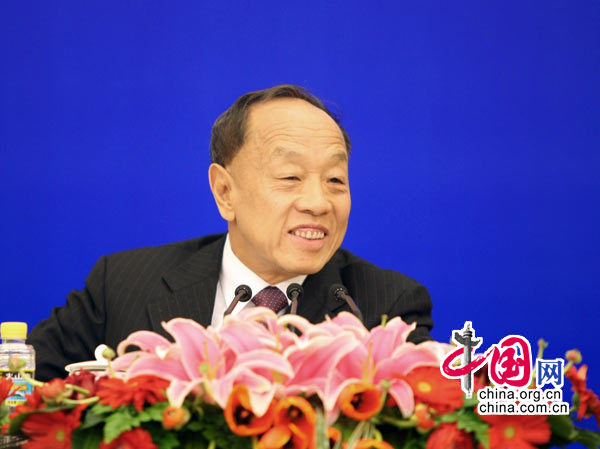China's defense budget to grow 7.5% in 2010
|
The spokesman of the session Li Zhaoxing is present to provide information about the session and answer questions from the media. |
China plans to increase its defense budget by 7.5 percent in 2010, only about half of last year's planned growth of 14.9 percent, a parliament spokesman said on Thursday.
The planned defense budget is 532.115 billion yuan (about 78 billion U.S. dollars), a rise of about 37 billion yuan from last year's defense expenditure, Li Zhaoxing, spokesman for the annual session of the National People's Congress (NPC), told a press conference.
Defense spending would account for 6.4 percent of the country's total fiscal expenditure in 2010, the same with last year, he said.
However, Li stressed that the figures would not be final until the budget plan is approved at the NPC annual session due to open in Beijing on Friday.
It is the first time for China's defense budget growth rate to drop to less than 10 percent in recent years which saw a row of consecutive double-digit increases.
According to Major General Luo Yuan, a researcher with the Chinese People's Liberation Army's Military Science Academy, the double-digit defense budget growth in the past years was mainly aimed to make up for the inadequacy of the country's defense development.
"This year's 7.5-percent increase signaled that China's defense development has entered a more mature, healthy and stable stage," said Luo, who is also a member of the Chinese People's Political Consultative Conference (CPPCC) National Committee.
At Thursday's press conference, Li Zhaoxing said China's increased defense budget this year will be mainly be spent to support the reform of the country's military and improve its capability to deal with varied threats and complete diversified tasks.
Part of the money will also be used to raise the living standards of servicemen, he said.
Li said China has always taken the road of peaceful development and keep in line with the defensive national defense policy.
Taking into account China's large population, its vast territory, and its long coastline, the country's defense budget is "comparatively low," according to the former Foreign Minister.
"China's defense expenditure in recent years accounted for about 1.4 percent of its GDP," he said, adding that the ratio was four percent for the United States, and more than two percent for the United Kingdom, France and Russia.
The country's limited military force was completely for the sake of safeguarding sovereignty and territorial integrity, Li said.
China has always attached great importance to keeping its defense budget at a reasonable level, which was in accordance with its defense and economic development, he said.
His words were echoed by Wen Bing, a researcher with the Chinese People's Liberation Army's Military Science Academy.
Wen said the slowdown in defense budget increase in the context of the lingering global financial crisis and the world's improving security environment "is appropriate, scientific, ... and is in line with China's needs for economic development and national security."
Li said China has been continuously raising its military transparency by submitting defense budgets to the NPC annual sessions for approval, issuing white papers every two years on its national defense, and establishing a spokesperson system and websites for its Defense Ministry.
Luo Yuan also backed China's transparency in its defense budget.
"In a certain sense, where the defense spending goes is far more important than how much the defense budget is," Luo said.
Go to Forum >>0 Comments
 Add your comments...
Add your comments...
- User Name Required
- Your Comment
- Racist, abusive and off-topic comments may be removed by the moderator.
 0
0 







